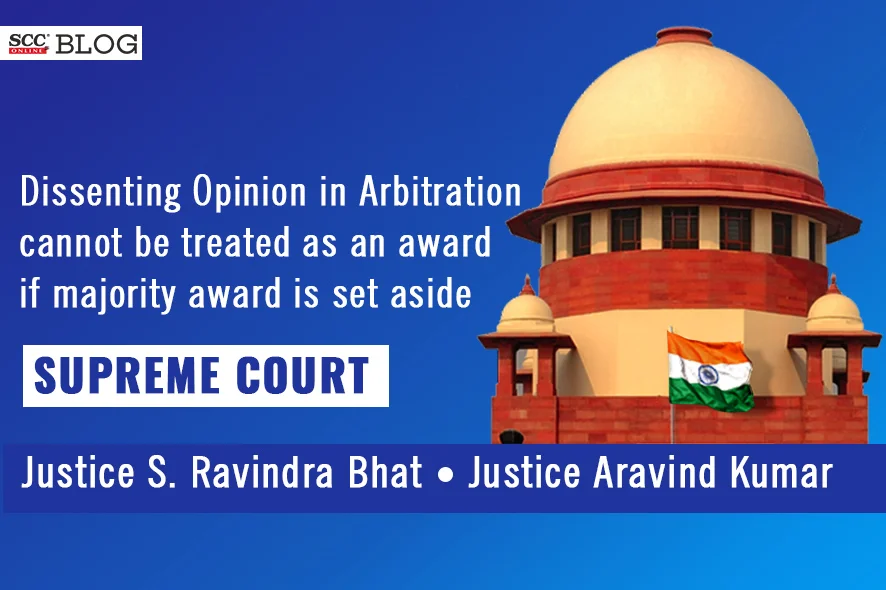Supreme Court: In a batch of civil appeals, a common question was to be dealt with relating to the interpretation of a contract condition which required the measurement of quantities used for payment for embankment construction with soil or with pond ash. The Court also dealt with the question of relevance of dissenting opinion in arbitration, the division Bench of S. Ravindra Bhat* and Aravind Kumar, JJ. observed that a dissenting opinion cannot be treated as an award if the majority award is set aside.
Background
The dispute arose between the appellants/ contractors and the National Highways Authority of India (‘NHAI’) with reference to the different areas of contract for the construction of the Allahabad by-pass project. The appellants contended that the measure is one and the same, which is by taking a composite cross section as a whole of the embankment and determining the volume by the average end area method. Whereas the supervising engineer (‘EE’) adopted a method by which the area of the cross section was bifurcated to account for the area occupied by soil and pond ash for the determination of quantum of the embankment in two different items. The appellant’s case was that the said interpretation by the EE was contrary to the technical specification (‘TS’) clause of the contract. The NHAI justified the EE’s interpretation. The appellants were not satisfied with the Dispute Resolution Board’s (‘DRB’) opinion and the matter was subsequently referred to arbitration.
Three technical persons were appointed as arbitrators, who gave a unanimous award, except on few issues there was a dissenting opinion of one of the arbitrators. Objections were preferred by the appellant under Section 34 of the Arbitration and Conciliation Act, 1996 (‘the Act’) against both the unanimous and majority views. The single judge opined that as far as measurement aspects were concerned, the tribunal’s majority opinion reflected a plausible and reasonable view that did not call for interference. However, the Division Bench set aside the single Judge’s opinion and held that the tribunal’s majority view, and award, were based on an implausible interpretation of the contract.
Decision
The Court said that the opinion of the technical experts constituted as arbitrators, who were familiar with the contractual interpretation of the type of work involved and they also had first-hand experience as engineers who supervised such contracts. Hence, the Court said that when the predominant view of these experts pointed to one direction, i.e., a composite measurement, the question was what really is the role of the Court under Section 34 the Act?
The Court referred Voestalpine Schienen GmbH v. Delhi Metro Rail Corpn. Ltd., (2017) 4 SCC 665, wherein the value of having expert personnel as arbitrators was discussed and it was emphasized that “technical aspects of the dispute are suitably resolved by utilising their expertise when they act as arbitrators”. The Court said that for appellate review, the Judges tend to adopt a corrective lens by training, inclination and experience. However, when exercising jurisdiction under Section 34 of the Act, the corrective lens of the Judges is unavailable. Therefore, the Court viewed that the Courts cannot, through process of primary contract interpretation, create pathways to the kind of review which is forbidden under Section 34 of the Act. Hence, the Court said that the exercise of appellate review by the Division Bench resulting in displacing the majority view of the Tribunal, and in many cases, the unanimous view, of other Tribunals, and substitution of another view, was impermissible since the majority view of the arbitrators was plausible and the Court found no reason to hold otherwise, as concededly the work was completed and the finished embankment was made of composite, compacted matter, comprising both soil and fly ash.
The Court also reiterated that it is the settled jurisprudence of the Courts that awards which contain reasons, especially when they interpret contractual terms, ought not to be interfered with, lightly. Further, the Court highlighted an aspect of relevance of dissenting opinion in arbitration which is likely to arise in some arbitration proceedings, especially involving adjudication by multi-member tribunals. The Court opined that the approach taken in Dakshin Haryana Bijli Vitran Nigam Ltd. v. Navigant Technologies (P) Ltd., (2021) 7 SCC 657, directing the dissenting opinion to be treated as an award, was correct. The Court also pointed that in Russel on Arbitration, it has been brought out that a dissenting opinion is not per se an award, but “is for the parties’ information only and does not form part of the award, but it may be admissible as evidence in relation to the procedural matters in the event of a challenge.” The Court also referred to Gary B. Born’s commentary on International Commercial Arbitration, wherein it has not been expressly pointed that the dissenting opinion is not a part of the award, yet it has been clarified that “this is an essential aspect of the process by which the parties have an opportunity to both, present their case, and hear the reasons for the Tribunal’s decision; not hearing the dissent deprives the parties of an important aspect of this process.”
Therefore, the Court observed that a dissenting opinion cannot be treated as an award if the majority award is set aside. The Court explained that it might provide useful clues during procedural issues, which forms a critical part when the hearings are challenged. The Court also said that the so-called conversion of the dissenting opinion into a tribunal’s findings when the majority award is set aside or elevation of a dissenting opinion as an award would be inappropriate and improper.
Thus, the Court allowed the appeals, and the impugned judgments were set aside. The awards which were the subject matter of challenge were upheld and restored.
[Hindustan Construction Company Limited v. National Highway Authority of India, 2023 SCC OnLine SC 1063, decided on: 24-08-2023]
*Judgment Authored by: Justice S. Ravindra Bhat



